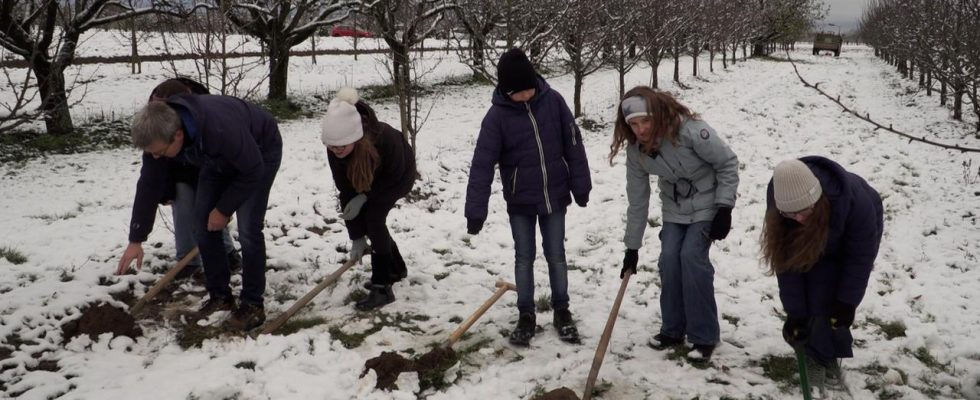In the middle
In Schweinfurt, students are looking for solutions to climate change – in the “Future Lab”. What was a pilot project in Bavaria last school year is now firmly on the timetable in some classes.
Lilly-Ann Kraus and five other students from her class dig holes in the ground with spades. At temperatures around freezing point they stand on an orchard between plum trees. “I find it very interesting here,” says Lilly-Ann. “It’s cooler than sitting around at home, and the cold doesn’t really bother me.”
Andreas Markert, a fruit farmer in Kolitzheim in the Schweinfurt district, explains to the sixth graders how to protect the soil from drying out. He shows them the heaps of earth they have dug up. “In the upper layer we have the humus here. That’s what we want,” he says. The humus makes the soil more climate-resilient because it is a very good water reservoir. This is particularly advantageous in the hot and dry summers, says Markert.
Pass on the knowledge
The students at the Walther-Rathenau-Gymnasium Schweinfurt are learning all of this in a new way “Future Labs” teaching concept. Geography teacher Oliver Kunkel developed these “laboratories of the future”.
A Future Lab class is divided into several groups. You visit various companies such as a winemaker and a forester. There, the groups let the experts explain what problems climate change is causing. In class – around three hours per week – the students develop, among other things, solutions for what can be done to combat climate change and its consequences.
The children and young people should pass on their knowledge to their parents, friends and relatives. “They should carry the virus of change into the adult world,” says teacher Kunkel.
Future Lab classes are to take place worldwide work together
Kunkel has a vision: In the “Future Labs” students around the world should work together on solutions to climate change. The geography teacher works three to four hours a day to spread the Future Lab concept in Europe and Africa. To this end, he has now formed cooperation with universities and climate research institutes. He is also on the board of the Bavarian Parents’ Association, which also supports the “Future Labs”.
The teacher has already made his first contacts – to Ghana in West Africa. The Schweinfurt sixth graders talk to students from Ghana via video conference.
The class from Ghana has the problem that the water in their lake is evaporating more and more due to the sun. But agriculture needs water – especially in the dry season. The solution could be for floating solar panels to reduce solar radiation on the lake and therefore evaporation. But such panels cost a lot of money.
The sixth graders of the Walther-Rathenau-Gymnasium speak to students in Ghana via video conference.
Used power storage from Germany
Lilly-Ann makes a suggestion to the students from Ghana. She speaks into the tablet camera in English: “We could get you used panels and power storage devices in Germany. They are cheap and completely okay.”
Lilly-Ann forms a working group with some of her class. Teacher Kunkel helps you find used solar panels on the Internet. You will quickly find what you are looking for.
Kunkel points to his tablet and explains: “There are panels that have been discarded from solar parks. For Africa, even though they are eight years old, they would still be super efficient because the sun shines so brightly there.”
Oliver Kunkel and his students search for used solar modules on the Internet.
Fundraising campaign for used solar modules
Lilly-Ann and her working group want to raise enough money through fundraising campaigns until spring. The sixth-grader draws an interim conclusion: She never thought that her class would find so many great ideas for doing something about climate change. If everything goes well, the sixth graders will then send used solar modules to Ghana.
Another important component is to be promoted in the “Future Labs,” says Kunkel: “brain-friendly learning.” “I want to translate the findings of neuroscience into a contemporary school.” This can be promoted through mindfulness exercises, movement and coordination training, but also lessons in nature. There are also learning and understanding techniques for various school subjects such as math and foreign languages.
What is particularly important is that the students perceive and understand how their brains “tick”. According to Kunkel, in the “Future Labs” they develop and internalize the answers to many questions: How can I remember something in the long term? How can I better understand complex relationships? How can I develop my own creative ideas and use them to solve problems? How can I concentrate better and also develop a desire for the effort? How do I become stress-resilient, content and optimistic?
Mastered challenges give motivation
According to the teacher, the biggest benefit for the children and young people is to experience self-efficacy. They then felt: I achieved this through my effort. For example, when the sixth graders try to organize used solar panels for their partner Future Lab in Ghana and have to overcome several challenges.
They want to raise the financing through fundraising campaigns. They will also take care of transporting the modules in a container. In addition, they will develop buoyant structures for the solar panels with the African class.
When they finally see their solar system on the lake via video conference next summer, they will be deeply satisfied, says Kunkel. This inspires them to make further efforts.

